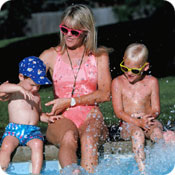 Being interested in doing things outdoors doesn't stop when you are pregnant. And why should it? The good news is that you can continue to do many of the outdoor adventures you love. Below are some great activities you can do to get that fresh air and feeling of freedom you crave.
Being interested in doing things outdoors doesn't stop when you are pregnant. And why should it? The good news is that you can continue to do many of the outdoor adventures you love. Below are some great activities you can do to get that fresh air and feeling of freedom you crave.
Hiking
Hiking is one of the best ways to stay fit and active outdoors. There are so many things to see and do while hiking and it is a great way to clear the head of the hustle and bustle of our busy lives. Hiking can take many levels of difficulty so it is best to find out about the trail before you go. Here are some other tips to keep in mind.
- Drink lots of water. Water is important for everyone but it is especially for pregnant women because of the risks and complications associated with dehydration and the unborn child. Bring plenty of water with you.
- Take plenty of food and healthy snacks. Hiking can easily burn up 500 calories in an hour or two and you need an extra 300 calories per day when pregnant. Eat before you leave, snack during the hike and eat when you get back.
- Do not carry a heavy load or pack. A light day pack with some snacks and a jacket is ok, but you should not be carrying any significant weight. Give the gear to someone else and have them help you carry it. Experienced hikers may be able to comfortably carry heavier packs, but for most pregnant women a day pack of 5-10
- Always tell someone where you're hiking and what time you plan to return. If reception is available where you are hiking, take a mobile phone in case of an emergency.
- Wear sunscreen and reapply often to help protect you skin and avoid the development of melasma, a hormonally caused increase in the brown pigmentation on your skin.
- Carry a first aid kit and emergency supplies such as waterproof matches, several candles, a space blanket and energy bars or trail mix.
Camping
Camping can mean many different things to different people. For some, camping involves having permanent restroom facilities, heated showers and unloading a car (20 feet from the campsite) packed with down pillows, comforters and coolers full of soft drinks and perishable food. For others, it means an expedition sized backpack, a 15 mile hike to a remote site and a search for water when you get there. Like most recommendations you are going to hear, moderation is key when it comes to being pregnant and camping. Here are some points to keep in mind.
- When hiking into a campsite, remember that you do not want to carry too much weight. Have a friend help carry or park close to the site and make multiple trips.
- Bring a comfortable sleeping pad if possible. The ground is much harder than you are familiar with, and you may find it uncomfortable on your joints to be on that harder surface.
- Pitch your tent in a place where the water will not pool under you if it rains. This means you should have a slight slope away from your tent or soil underneath you that drains well.
- Be ready for the elements. Temperatures can drop quickly, or days can get unexpectedly hot. Pack appropriately and be ready to protect yourself from biting insects and ticks. Check with your doctor about what insect repellents are safe for pregnancy and small children you may have with you.
- Bring your own water or drink from a safe water source. Iodine tablets to treat water are not recommended for pregnant women. Intestinal problems from water borne illnesses and the drugs to treat parasites can be quite serious for you and the baby.
- Boil any local water before drinking, cooking, brushing your teeth or washing your face. Before your trip to find out recommended boiling times according to the elevation of your camp. Check out water purification units at outdoor equipment stores for an alternative to boiling water.
- Prior to leaving for your trip it's a good idea to determine the closest medical facility to your camp site and discuss how you would handle an emergency so you'll be prepared.
- Avoid remote camping trips after 35 weeks of pregnancy or if your doctor is concerned about preterm labor.
With these thoughts in mind you should be able to have a safer and more enjoyable camping and hiking experience during your pregnancy. You should consult with your doctor about the appropriateness of camping and hiking on your health. He or she will be better prepared to judge how your physical condition matches with the degree of adventurousness of the trip.
Happy camping and hiking!
|
 Being interested in doing things outdoors doesn't stop when you are pregnant. And why should it? The good news is that you can continue to do many of the outdoor adventures you love. Below are some great activities you can do to get that fresh air and feeling of freedom you crave.
Being interested in doing things outdoors doesn't stop when you are pregnant. And why should it? The good news is that you can continue to do many of the outdoor adventures you love. Below are some great activities you can do to get that fresh air and feeling of freedom you crave.
.jpg)



Member Comments